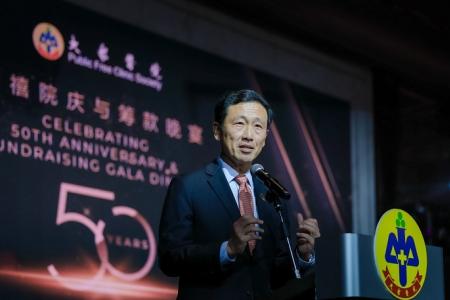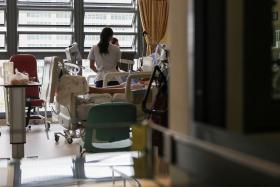TCM may be incorporated into public clinics, hospitals
Traditional Chinese medicine (TCM) practitioners may in future partner Western doctors under an expanded Healthier SG programme.
The Ministry of Health (MOH) is also exploring how to “carefully incorporate” certain TCM treatments into public clinics and hospitals, with patients able to get subsidies for such treatments, said Health Minister Ong Ye Kung on Oct 27.
In a speech setting out his vision for the TCM sector, Mr Ong added that including such treatments in mainstream healthcare should be selective and based on evidence.
“We should avoid the mindset or mentality of wholesale inclusion or wholesale rejection of TCM. That would be most unwise. This is a delicate process of trying to integrate and synergise between two fundamentally different systems, in origins and historical developments,” he said.
Research has also yielded “a lot of clinical evidence” on the efficacy of various TCM treatments, and these findings can be used to design experiments at public healthcare institutions that aim to achieve this synergy, he added.
Speaking at the Public Free Clinic Society’s 50th anniversary celebration at Orchard Hotel, Mr Ong also elaborated on the role he envisions for TCM practitioners in Healthier SG, the national preventive healthcare scheme launched in July 2023. The scheme encourages people to register with a family clinic to take personalised steps towards better health.
“Conceptually, the patient can be referred by a TCM practitioner to a GP for fully subsidised vaccinations, screenings and chronic disease management, while continuing with TCM care, including receiving support on adjusting their lifestyles,” Mr Ong said.
He noted that one in five Singaporeans sees TCM practitioners, making TCM a useful touchpoint to engage more people to join Healthier SG.
Over one million Singaporeans and permanent residents have been enrolled in Healthier SG, including one in three of those aged between 40 and 59.
“It is not bad, but can certainly improve,” Mr Ong said.
TCM takes a holistic approach to health and focuses strongly on preventive care, and should therefore have a role in Healthier SG, he added.
“In fact, I will say this is not a decision for the Government or for our Western doctors to make. It is already decided by many Singaporeans, who are choosing TCM,” Mr Ong said. “Our job is to synergise the efforts between Healthier SG and TCM, and ensure that high-quality and appropriate preventive care is delivered to as many Singaporeans as possible.”
However, he noted that if TCM practitioners are involved in an expanded Healthier SG, part of the fees paid by the Government under the scheme would have to go to them.
Mr Ong urged his audience to keep an open mind on the topic, adding: “After all, MOH is spending an additional $400 million a year on Healthier SG, and about $110 million is spent through GPs, and that includes service fees and subsidies for preventive care, such as screening and vaccinations.”
This amount is expected to rise as Healthier SG gains momentum and enrolment goes up, he said.
“This is an expanding pie, which enables us to be more inclusive, including TCM practitioners, and deliver better results.”
Mr Ong listed three things to develop the partnership between general practitioners and TCM practitioners.
First, MOH will consult both groups on possible collaborative models to appropriately allocate the roles and workflows between them.
“There is no question that health screening, vaccinations and chronic disease management, being Western medicine interventions, will need to be performed by Western GPs. What TCM practitioners can play a very useful role in is lifestyle changes, given the holistic approach to health in TCM,” said the minister.
The TCM Practitioners Board is also working with MOH on an accreditation framework for TCM practitioners.
This framework would recognise those who meet higher professional and competency standards, and could be used to decide on eligibility to participate in the expanded Healthier SG scheme.
It is expected to launch in 2026 and should be voluntary, Mr Ong said.
In addition, he called on TCM clinics and institutions to start exploring partnerships with Western medical practitioners and clinics.
“The business model under a GP-TCM partnership can be a sensitive matter. But I believe there are willing parties in both the GP and TCM sectors who want to work this out. Ground-up proposals on a joint participation model to expand Healthier SG, with suggestions on both patient management and fee apportionment, will be a significant step forward,” he said.
Mr Ong also spoke on TCM education and qualifications, saying that the requirements to attain a TCM practising licence will be streamlined.
For one thing, graduates of NTU’s Bachelor of Chinese Medicine degree programme will no longer have to take the Singapore TCM Physicians Registration Examination. “(This exam) is when many graduates trip, and then they are unable to get the licence to practise,” Mr Ong said.
NTU is strengthening its assessment of these students, who will get their practising certifications upon graduation, he added.
Graduates from Singapore’s two other TCM schools – the Singapore College of Traditional Chinese Medicine and the Institute of Chinese Medical Studies – can be exempted from the theory part of this exam. However, all graduates will still need to be assessed on their clinical competencies to obtain their practising certificates, Mr Ong said.
“Not only will this streamlined approach reduce students’ burden in having to take multiple theory tests, it (also) allows our TCM practitioner candidates to focus their efforts in honing their clinical skills and better prepare for the clinical competency assessment,” said the minister.
Get The New Paper on your phone with the free TNP app. Download from the Apple App Store or Google Play Store now


